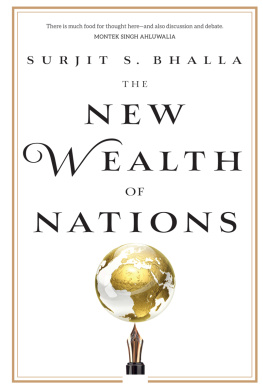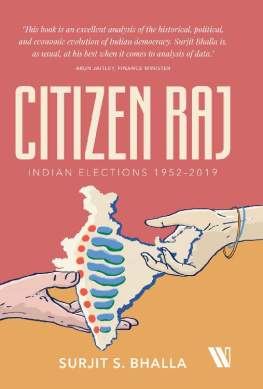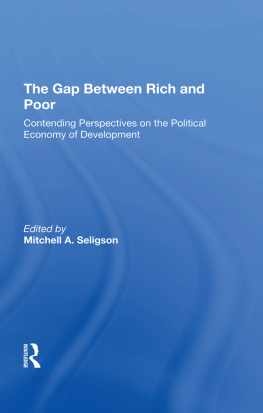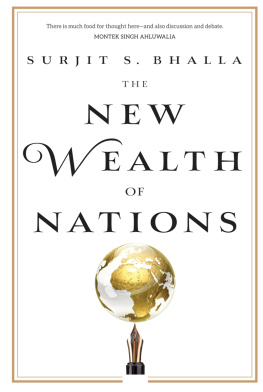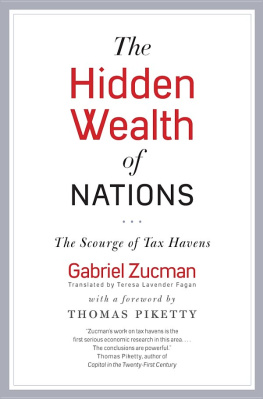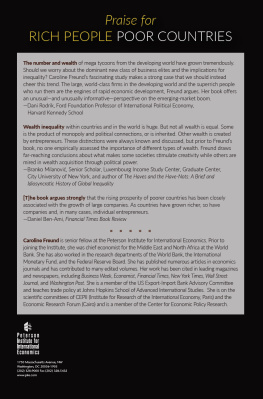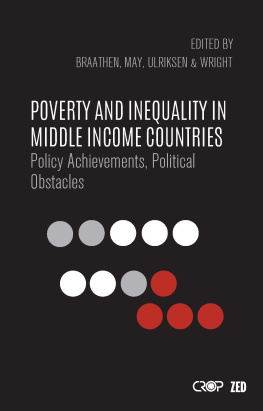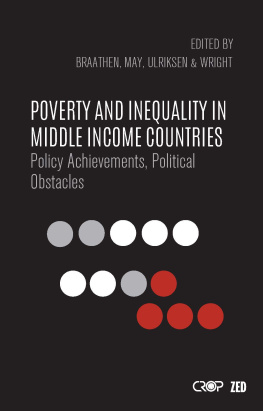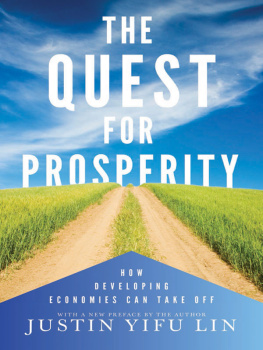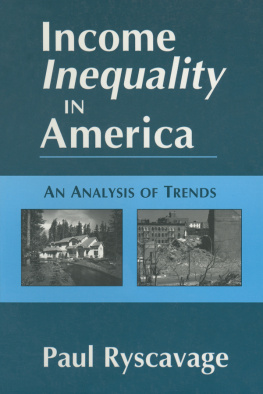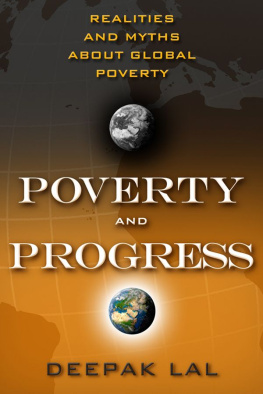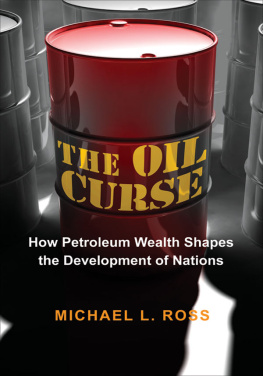ACKNOWLEDGEMENTS
R esearch is the thrill of discovery, and that explains why this book is not about what it was originally meant to bean expanded, improved, and updated version of my 2007 manuscript Second among EqualsThe Middle Class Kingdoms of India and China. The measurement of the size of the middle class and its influence on policy and growth by researchers and institutions has increased manifold since 2007. A decade later seemed like a perfect time to review, evaluate, and update.
I happened to be in the quiet, sleepy German town of Bielefeld, where Ravinder Kaur was teaching a short, intensive course on Gender, Technology, and Society. Bielefeld reminded me a lot of my own university town in the mid-1960sPurdue University, West Lafayette, Indiana, in the middle of the Bible Belt, in the middle of nowhere, in the middle of mid-Western Americabut a perfect place for education and thinking. She was teaching a class, I was working on my middle class book.
However, progress was slow, the writing difficult. Call it a writers block or a lack of inspiration. Much as I wanted to get my middle class story on the cover of Rolling StoneI hear that the magazine is up for saleI was not able to get terribly excited about dwelling on that ten-year journey. Instead, I found true excitement in revisiting my journey since childhood.
Thought fermented around the things that tied together my research and policy interestspoverty, the middle class, development, the elite, joblessnessdemocracy, economic growth, and wealth. Finally, the Eureka moment! It all seemed to be inextricably tied with education.
There have been several markers in the intellectual journey that is contained in The New Wealth of Nations. It seems that forever I have been waiting to write about education. Indeed, my first ever publication as a young graduate student in 1973 was a survey of the literature about the relationship between education and income. My contribution was labelling it as The EducationIncome Connection, and bears something of this title. (Any correlation with my film obsession and my fondness for thrillers is not coincidentalthe movie The French Connection was released in 1971.) In 1974, I was awarded a pre-doctoral fellowship to the Brookings Institution; the subject of my proposed dissertation was: Inter-generational Inequality via Education. I ended up writing my dissertation on another topic, but the interest has remained.
The editor at Simon and Schuster Dharini Bhaskar was tolerant enough to allow me extra time to finish. And thanks also to Dharini and Sayantan Ghosh for their suggestions and inputs towards transforming a quasi-academic subject into a (I hope successful) trade book!
There are various intellectual debts accumulated. I am lucky to have several close friends who have helped in this, and previous, discoveries. As every researcher knows, the exact origin of ideas is a broad unknown. Ravinder (also my wife) has argued, helped with intellectual inputs, sharpened my arguments, and kept me balanced in my outlook and philosophy. If I am even half as helpful with her forthcoming book, I will consider that an achievement.
Suman Bery and Robert Lawrence have influenced my thinking and research in more ways than they give themselves credit (or blame) for. Homi Kharas, Farrukh Iqbal, and Arvind Virmani have been consistently generous with their time, arguments, and suggestions. And over the last few years, Josh Felman has been ever helpful with discussions. And all of them have sometimesmake that oftenbeen too critical... but what else are friends for?
There are several other intellectual debts that need to be accounted for. I had worked on the Velocity 12 Project for Ogilvy & Mather, and I learnt a lot from Kent Wertime about the middle class and the sociology of development. I look forward to our joint work on the massive change in social life brought about by divorce, both individual and political.
Ruchir Sharma has led a self-styled gang of Limousine Liberals on election trips to different parts of India for the last twenty years. I have been a participant in many, and these trips have helped sharpen my analysis of development. Thank you, Ruchir, and I am dreading the day the team gets an election forecast wrong.
I have been an invitee since 2002 to the annual Aspen Program on the World Economy. Thanks, Bo Cutter, and especially for the discussions about politics, economics, and sports.
There are other debts. The Observatory Group has allowed me time to finish the book. More importantly, my analysis and my writing for a non-academic audience have improved enormously from my interaction with my editor-colleagues Ed Kean, Mary Rosenbaum, and Jin Saito.
There are yet other debts. Orley Ashenfelter, Alan Blinder, and George de Menil read through portions of the book (especially ), and while they are not responsible for the content, they are responsible for influencing my thinking. And Montek Ahluwalia has been doing so for the last 40+ years. Thank you.
While we are on the subject of thinking, the support of the family through discussions, intellectual inputs, arguments, disagreements, and agreements should not be underestimated. Im indebted to Ravinder, Simran, and Sahil for being tolerant, and enabling, and feisty.
No long-run research is possible without the support of a team of research assistants. Over the years, I have benefitted from the support of Tirtha Das, Manoj Agrawal, Ankur Choudhary, Prasanthi Ramakrishnan, Rohini Sanyal, and Abhinav Motheram.
I have a DNA which is ++ and leads to an optimistic outlook (as testified by this book). Perhaps medical science will soon discover whether lifes experiences lead to a ++ disposition or ones genes. The New Wealth of Nations is the product of research, experience, and maybe genes.
Select Bibliography
Alan Heston, Robert Summers and Bettina Aten. 2002. Penn World Table Version 6.3. Center for International Comparisons at the University of Pennsylvania (CICUP), August.
Alesina, Alberto and Eliana La Ferrara. 2004. Ethnic Diversity and Economic Performance. NBER Working Paper, no. 10313, November.
Alvaredo, Facundo, Anthony B. Atkinson, Emmanuel Saez and Thomas Piketty. 2015. The World Wealth & Incomes Database.
Anand, Sudhir and Ravi Kanbur. 1993. The Kuznets Process and the InequalityDevelopment Relationship. Journal of Development Economics 40, no. 1: 2552, June.
Anesi, George. 2003. Private Property and the Rule of the Middle Class in Aristotles Politics. Draft, Classics of Social and Political Thought. Department of Social Sciences, University of Chicago, November.
Ashenfelter, Orley and Joseph D. Mooney. 1968. Graduate Education, Ability, and Earnings. The Review of Economics and Statistics 50, no. 1: 7886.
Asian Development Bank. 2002. Asian Drama Re-visited: Policy Implications for the Poor. Report prepared for research project RETA-5917 by a team led by Surjit S. Bhalla.
Autor, David H., Lawrence F. Katz and Melissa S. Kearney. 2005. Rising Wage Inequality: The Role of Composition and Prices. NBER Working Paper, no. 11628, September.
Banerjee, Abhijit and Thomas Piketty. 2005. Top Indian Incomes, 19222000. The World Bank Economic Review 19, no. 1: 120.
Barro, Robert J. and Jong-Wha Lee. 2013. A New Data Set of Educational Attainment in the World, 1950-2010. Journal of Development Economics 104: 184198.
_____.2015. Education Matters: Global Schooling Gains from the 19th to the 21st century. New York: Oxford University Press.
Becker, Gary S. 1957. The Economics of Discrimination (2nd Edition). Chicago: University of Chicago Press.
_____.1960. An Economic Analysis of Fertility. Demographic and Economic Change in Developed Countries. New Jersey: Princeton University Press for NBER.
Next page
